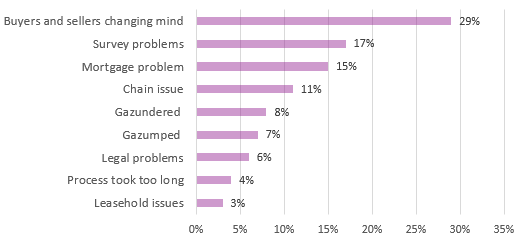Changes of heart are behind almost a third of sales that fall through
04 November 2019: Buyers and sellers changing their minds are behind almost a third (29%) of all property transactions that fall through before exchange, according to new consumer research by home move comparison site reallymoving.
- Two out of every three buyers and sellers have experienced a fall through in the last year
- Buyers and sellers changing their minds is the leading cause of sales falling through (29%)
- Problems identified on the survey is the second most common reason (17%)
- Two thirds (67%) of buyers and sellers support the idea of Reservation Agreements
The findings reveal widespread consumer support for the Government’s proposed Reservation Agreements, which are likely to be trialled in early 2020, with 67% of buyers and sellers believing they would have benefited from the agreements, indicating frustration at the lack of consequences for parties that that cause the collapse of property sales.
The survey of 574 customers who used reallymoving for conveyancing quotes between 1st July 2018 and 1st July 2019 revealed that two out of every three buyers and sellers (67%) have experienced a fall through in the last twelve months. The main reason behind the failed transactions was buyers and sellers changing their minds (29%), followed by a problem discovered on the survey (17%) and difficulties obtaining mortgage finance (15%). The latter highlights the importance of estate agents vetting potential buyers to ensure they have a mortgage offer in principle before committing to a sale.
Other common reasons for fall throughs include issues arising up or down the chain, gazundering, gazumping, problems in the legal process and the transaction taking too long to progress (see Graph 1).
Graph 1: Reasons behind property deals falling through between July 2018 – July 2019.
Two thirds (67%) of those buyers and sellers surveyed believed that Reservation Agreements would have benefited them. The Government has indicated it is keen to trial Reservation Agreements in two pilot regions of the UK in early 2020, with a view to making them a statutory part of property sales in the UK (1). At the point a sale is agreed, buyers and sellers would be obliged to pay a fixed amount, possibly between £500 to £1,000, as a deposit to lock them into the agreement. If the buyer or seller pulled out for anything other than a genuine reason, such as a major problem being identified on the survey, they would forfeit their deposit.
Rob Houghton, CEO of reallymoving, said:
“The system for buying and selling property in England and Wales is fundamentally unfair, requiring both buyers and sellers to commit considerable sums of money to a process in which they are entirely unprotected. People are also forced to make life changing decisions about moving to a new area, perhaps changing jobs, children’s schools and so on, while at any moment the other side can pull out of the deal without consequence.
“To save the millions of pounds wasted through collapsed deals every year and to foster renewed trust between buyers and sellers, change is urgently required. Reservation Agreements, which would require both sides to part with a lump sum of cash at the point an offer is agreed, would undoubtedly prompt people to think hard about their commitment to the process, which can only be a good thing. The devil will be in the detail however and there will need to be clear guidelines outlining what exactly constitutes a genuine reason for withdrawing from a sale.”
[1] Matt Prior, Government official responsible for home buying and selling work at the Ministry of Housing, Communities & Local Government laid out plans for trialling Reservation Agreements at a speech at the Westminster Legal Policy Forum seminar on 10th October 2019.
Kindly shared by reallymoving.com



















